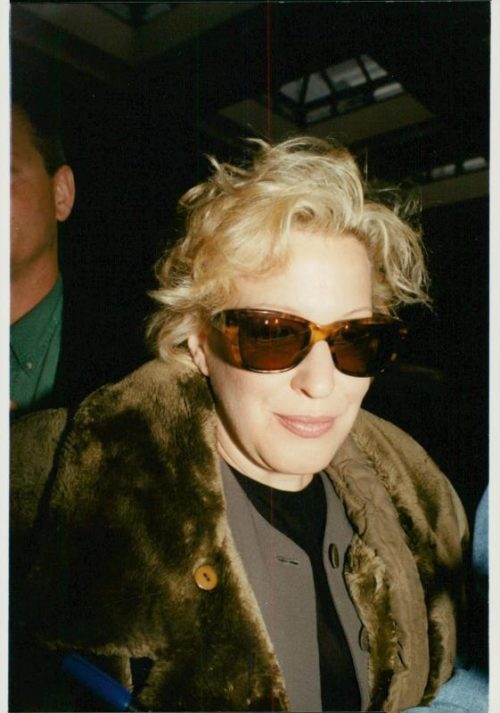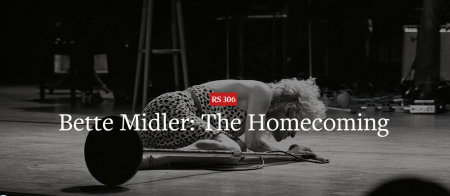The Advocate
Bette Midler on Gay Culture: ‘It’s Sort of Ordinary Now’
The Divine Miss M dishes on her new album, It’s the Girls, and her joy watching the gay rights movement transform from the love that dare not speak its name to ‘the love that won’t shut the fuck up.’
BY JASE PEEPLES NOVEMBER 19 2014 9:00 AM E
The first time Bette Midler heard a song by a girl group, she says, it changed her life.
“When I was a little girl, my family didn’t have much of anything and I remember this well-off lady once gave us a record player along with a couple of 78 RPM albums,” she recalls. “’It’s The Girl’ by the Boswell Sisters was on one of those 78s and I used to listen to it over and over. I just fell in love with their sound. It was very jazzy and they were so sophisticated musically. It was just incredible. I don’t think I ever heard music the same way again after that and I’ve been in love with the sound of female voices harmonizing ever since.”
That memory was a part of the foundation for Midler’s new album, It’s the Girls, a collection of covers that pays tribute to many of the girl groups whose sounds helped shape the Divine Miss M’s love of music over the years.
Once she’d settled on the direction of her 14th studio album, Midler says she couldn’t wait to dive into the recording studio to put her spin on songs that had meant so much to her throughout her life, but she had only one rule before any track could be considered for the collection: it had to be a song from a “real girl group.”
“My favorite thing about girl groups, real girl groups, is that they put themselves together and they made their own sound,” she explains. “It wasn’t a producer that came along and imposed his idea upon them. They came with their sound and then the producer enhanced that sound. So a group like the Spice Girls – I know a lot of people love them and I think they’re adorable – they just weren’t for me.”
From the Boswell Sisters and the Ronettes to Motown acts like the Marvelettes and Martha Reeves and the Vandellas, Midler says she and her longtime collaborator Marc Shaiman combed through dozens of songs before settling on those that appear in the collection, but she knew it wouldn’t feel complete until she bent the one rule she’d made when they embarked on the project.
“Oh, how I did love TLC,” she says, “and ”˜Waterfalls’ was just a song I fell in love with the first time I heard it. To me it was always this terrible little tragedy, and I’ve always thought that because the beat was so captivating and the rap was so captivating that people didn’t really hear the misery in the lyrics behind the beat. So I’ve always wanted to do it as a ballad so that people could really hear the lyrics and the message behind them. I’ve carried that one around in my back pocket for years and I knew this album was the perfect opportunity to finally do it.”
Midler says recording the album was a fun, nostalgic trip that left her longing for the golden age of not only the girl groups who influenced her over the years, but also the gay fans who supported her throughout her career. “The extreme characters you used to see in the Village in the old days, you just don’t see them anymore, and I really do miss them because there was a feeling I used to get that people were expressing themselves in the most elaborate of ways,” she says of the flamboyant fans who were among the core following she gained during her time singing in the Continental Baths, a gay bathhouse, during the summer of 1970. “Now the [gay community] has kind of gone mainstream. It’s sort of ordinary now, and a little bit of the specialness has rubbed away.”
“It used to be the love that dare not speak its name and now it’s the love that won’t shut the fuck up,” she jokes, stopping to let out a long laugh before adding, “but seriously, the great thing about the gay revolution is that it has become ordinary and I’m happy to see how far it’s come and to see the community be more at peace with itself and, I want to say, more homogenized. Even being considered a gay icon – which was something that used to be whispered and bandied about – has become sort of mainstream, and that’s a good thing.”
While the battle for equality moves forward in the U.S., the 68-year-old artist and activist says she’s passionate about raising her voice in the pursuit of global human rights. “I’ve had no problem raising my voice and will continue to do so,” she says. “Of course, sometimes you get kicked in the face for it, but some people are always looking for someone to come down hard on. I say fuck ’em, because if you don’t stand for something, you’ll fall for anything.”
“Just look at the treatment of [LGBT people] and women around the world,” she adds. “I just think it’s ghastly what happens. There’s a gigantic threat there from all sorts of religions and I’m greatly concerned when I hear of things like women getting stoned because they looked sideways at some guy or gays being killed because of who they are. It’s just repulsive.”
Though Midler insists her passion for human equality isn’t something that will ever change, she says fans planning to see some familiar faces on her upcoming tour should prepare themselves.
“In the old days I couldn’t wait to do certain characters that have become staples of my shows, like Delores, my mermaid,” she says. “But I have to tell you I think I’ve had enough mermaid. The last time we worked with her she had a 21-mermaid chorus, and that’s a big chorus for a little fish. So I think that was the apex of her career.”
Through fits of laughter she continues, “At this point I don’t really see what more I can do except sauté her and serve her on a bed of lettuce.”
But while the legendary lady is happy to be leaving longtime companions like Delores in the past, she’s thankful others have remained in her life and she’s excited to perform for them once more. “I think I’ve been really lucky because my gay crowd had followed me to the limit and the fact that they are so vocal and so full of joy each time they see me, I think that’s a very infectious energy in the audience at my shows,” she says. “I think they’re the ones who brought the straight people around and it’s because of them that people get me to such a wonderful degree now.”












